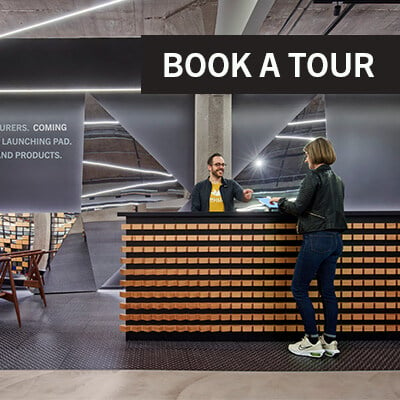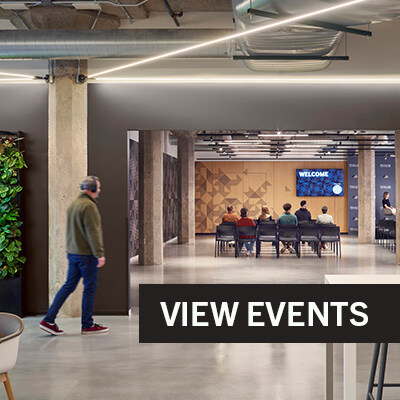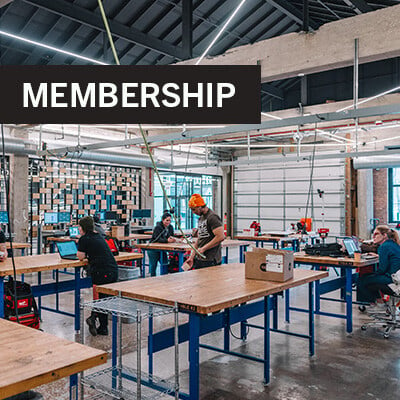From Hunch to Hardware: Lessons from mHUB’s Product Case Study with Bill Fienup
When it comes to hardware innovation, ideas are plentiful. The challenge lies in turning a spark of inspiration into a viable product that customers will pay for, manufacturers can build, and businesses can sustain. At mHUB, this is the journey the community lives every day—and few embody it more than Bill Fienup, mHUB Co-Founder and VP of Innovation Services.
In the workshop Product Case Study with Bill Fienup, Bill used his own side project, CanChill, as a living case study. CanChill is a device designed to chill canned beverages in minutes using conduction. What began as a simple frustration with exploding Red Bulls in the office freezer became a test bed for mHUB’s three-loop product development framework: Discovery → Feasibility → Viability.

Meet the Builder
Bill leads mHUB’s Hardtech Development Services, a consulting arm that guides companies (large and small) through design, testing, and manufacturing new products and processes. His background spans MIT, IDEO, Insight Product Development, and multiple startups. What defines his career isn’t just creativity—it’s a relentless focus on testing ideas quickly, learning from constraints, and executing with discipline.
The Spark: Cold Drinks, Fast
The inspiration for CanChill was personal and relatable. Like many, Bill often forgot beverages in the freezer, leading to explosions. Off-the-shelf “rapid chillers” existed, but they were either slow, cumbersome, or impractical. Early experiments with conduction proved far faster than convection, but Bill knew this insight alone was insignificant:
“Ideas aren’t precious—execution is. What matters is testing fast, sharing early, and learning from customers.”
This mindset anchored every stage of CanChill’s development and reflects the ethos mHUB instills in its builders.
The Framework: Discovery → Feasibility → Viability

At mHUB, product development is never a straight line. Instead, teams cycle through loops of Customer Discovery, Product Feasibility, and Business Viability. CanChill illustrates how these loops overlap, with each lesson building directly into the next.
1. Customer Discovery: Prove There’s a Problem Worth Solving
The first loop is all about desirability: Who has this problem? How are they solving it today? Is there evidence people will pay for a better solution?
- Benchmarking competitors. Bill bought several rapid-chill products, logged their performance, and defined a benchmark for “good enough.”
- Market signals. Tools like Amazon rank and sales data estimated unit velocity and market size. Far from being discouraging, the existence of competitors validated demand.
- Fake door testing. Landing pages and paid ads revealed customer acquisition costs (~$15) and a surprising finding: interest sometimes rose at higher price points, suggesting perceived value mattered more than discounting.
Key lesson: Don’t hide your idea—stress-test it. Market data, even directional, is worth more than assumptions.
2. Product Feasibility: Can Physics Deliver?
Once desirability was clear, the next loop asked: can engineering and manufacturing actually deliver the promise?
- Physics modeling. Early CAD models suggested dense fin structures would maximize conduction—but manufacturers rejected them as unmakeable.
- DFM trade-offs. The geometry was simplified to balance performance with tooling constraints.
- Extrusion experiments. Partnering with a supplier to test extrudable profiles created a path to low-cost tooling and higher-quality prototypes
- Usability guardrails. The target: a device no larger than a quart of ice cream that fit neatly in a freezer door. Tests confirmed this was realistic.
Key lesson: Ground big ideas. Simple calculations often reveal whether a concept is physically achievable.
3. Business Viability: Do the Numbers Work?
With prototypes in hand, the last loop asked: is this a business, or just a fun gadget?
- Landed cost: ~$20 per unit
- MSRP: ~$50 retail
- CAC: ~$15 from initial ad tests
- Gross Margins: Slim but workable (~30%), leaving room for optimization.
Bill stressed the importance of knowing your numbers before scaling:
“If your margin is under 20%, it’s not worth doing. Around 30% is healthy. Above 40% means competitors are coming for you.”
Key lesson: Hardware lives and dies on unit economics. A product can work beautifully and still fail if the numbers don’t add up.
What He’d Do Differently
- Engage manufacturers earlier to avoid spending months optimizing unmakeable designs.
- Share prototypes sooner. Customer feedback might have pushed toward a sleeker, koozie-like form factor earlier in the journey.
- Recognize personal strengths. Engineering and prototyping were fun; scaling sales and marketing requires complementary partners.
Practical Takeaways for Builders
- Benchmark first. Buy competitor products, measure their performance, and define what “better” means.
- Test demand early. Fake door landing pages can reveal CAC and price tolerance before you cut steel.
- Know your margins. Model landed costs, CAC, and MSRP. Aim for at least ~30% gross margin.
- Build a complementary team. Diverse skill sets beat three engineers with the same background.
The CanChill story demonstrates how moving through mHUB's framework for product commercialization—discovery, feasibility, and viability—removed uncertainty and transformed a hunch into a manufacturable product with a defined market and a viable path to scale.
For founders, engineers, and product managers, the blueprint is clear: validate the need, prove the physics, design for manufacturability, and let the numbers guide the decision.
At mHUB, that discipline is what turns sparks of inspiration into products that succeed in the real world.
Learn more about CanChill: https://thecanchill.com/
Explore mHUB’s upcoming workshops and resources to guide your product development journey.




.jpg?width=352&name=Fast_Company_mHUB_Best_Workplaces_Hardware_engineering%20(4).jpg)